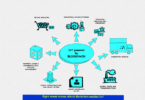Most investors believe that blockchain and BitCoin (the digital currency) are synonims. But it is not true. BitCoin is one of many applications that use an infrastructure calles blockchain.
Blockchain is essentially a software protocol to establish trust where there is none. Blockchain is trustworthy and transparent because the parties involved in an exchange can record data into database but can’t change this data. So, each participant has always an exact copy of the transactions.
Look this definition from Wikipedia:” A blockchain[1][2][3] — originally block chain[4][5] — is a distributed database that maintains a continuously-growing list of ordered records called blocks. Each block contains a timestamp and a link to a previous block.[6]:6 By design blockchains are inherently resistant to modification of the data — once recorded, the data in a block cannot be altered retroactively.”
IBM is heavily investing in the blockchain technology to disrupt large industries. A recent study from Markets and Markets speculates that the blockchain industry will grow from $210 million in 2016 to $2.3 billion by 2021, for CAGR of 61.5% during the forecast period.
A few examples of IBM applications in the blockchain industry:
- SBI Securities – testing blockchain for a new bond trading platform and for improving securities operations.
- Japan Stock Exchange – testing the potential of blockchain technology for use in trading in low transaction markets.
- Bank of Tokyo Mitsubishi UFG – using blockchain to examine the design, management and execution of contracts among business partners.
- London Stock Exchange Group – exploring blockchain to manage risk and bring additional transparency to global financial markets.
- Kouvola Innovation – using blockchain to transform logistics value chains into a more seamless process that provides a trusted view of every piece of cargo.
- Kenya – The government is utilizing blockchain to develop an immutable and transparent education management system. In order to reduce the issuance of fraudulent academic degrees and limit the market of illicit academic certificates, the Kenyan government is working with IBM to launch an academic certificate issuance platform on a blockchain network.
- BNY Mellon – designing and developing a unique application for securities lending, using a blockchain network to trade and transfer assets.
- Mizuho Financial Group – testing blockchain for settlements using virtual currency.
- Everledger – using blockchain to track diamonds and other valuable assets.
- CLS Group – collaborating with IBM so that its payment netting service using Hyperledger Fabric meets the requirements necessary for delivering a resilient, secure, and scalable service.
So, we can see the importance of blockchain.







